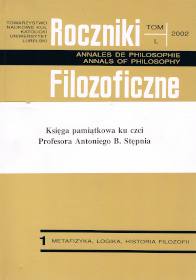On justification in mathematics
Abstract
In this article the problem of justification of mathematical axioms (in the context of traditional standpoints in the philosophy of mathematics) is discussed. Stress is laid on the methodological analysis, which concerns the notion of “justification” itself. Concrete choices, known from mathematical practice are not discussed here.
In the process of formulating an axiomatic theory, the problem of the choice of the appropriate axiom system and of the justification of this choice emerges. In particular, the following problems are connected with it:
(1) The problem of the relation between the concept of “justification” and “truth” of mathematical sentences (when the classical definition of truth is assumed).
(2) The problem which criteria of justification can be considered appropriate, and whether the problem of justification is well-posed.
(3) The problem, whether these criteria can be applied only to axioms, in the process of constructing an axiomatic theory, or also to independent sentences (after their metamathematical status has been settled. In that case, extending a theory T by an independent sentence φ or ¬φ cannot be justified by a formal proof.)
(4) The problem, whether the choice of a particular justificatory procedure is motivated philosophically; in particular, whether the problem of justification is considered well-posed.
These questions are analysed in the context of classical philosophical standpoints in the philosophy of mathematics, such as: (1) strict formalism; (2) Hilbert's formalism; (3) mathematical instrumentalism; (4) intuitionism; (5) Quine's realism; (6) Gödel's realism. The standpoint of the “working mathematician” is also discussed.
References
Cohen P. J. (1966), Set theory and the continuum hypothesis, New York− Amsterdam: W.A. Benjamin, Inc.
Cohen P. J. (1971), Comments on the foundations of set theory, w: Axiomatic set theory. Proceedings in Symposia in Pure Mathematics, 13, part 1, ed. D.Scott, AMS, Providence, Rhode Island.
Ellentuck E. (1975), Gödel's square axioms for the continuum, „Mathematische Annalen”, 216, s. 29-33.
Gödel K. (1940), The consistency of the axiom of choice and of the generalized continuum hypothesis with the axioms of set theory, w: Gödel 1990, s. 33-101.
Gödel K. (1944), Russell's Mathematical Logic, przedrukowane w: P. Benacerraf, H. Putnam, Philosophy of Mathematics, Prentice-Hall 1964, s. 211-232.
Gödel K. (1947/64), What is Cantor's Continuum Problem?, przedrukowane w: tamże, s. 258-273.
Gödel K. (1951), Some basic theorems on the foundations of mathematics and their implications, w: Gödel 1995, s. 304-323.
Gödel K. (1961), The modern development of the foundations of mathematics in the light of philosophy, w: Gödel 1995, s. 374-387.
Gödel K. (1970a), Some considerations leading to the probable conclusion, that the true power of the continuum is א2, w: Gödel 1995, s.420-421.
Gödel K. (1970b), A proof of Cantor's continuum hypothesis from a highly plausile axiom about orders of growth, w: Gödel 1995, s.422-423.
Gödel K. (1972), Some remarks on the undecidability results, w: Gödel 1990.
Gödel K. (1990), Collected Works, vol. II, red. S. Feferman i in., Oxford: Oxford University Press.
Gödel K. (1995), Collected Works, vol. III, red. S. Feferman i in., Oxford: Oxford University Press.
Hilbert D. (1926), Über das Unendliche, „Mathematische Annalen”, 95, s. 161-190. (Tłum. pol. w: Filozofia matematyki. Antologia tekstów klasycznych, red. R.Murawski, Poznań: Wydawnictwo UAM 1986, s. 288-307).
Maddy P. (1988), Believing the axioms, I, „Journal of Symbolic Logic”, 53, s.481-511.
Moore G. H. (1982), Zermelo's axiom of choice, Springer-Verlag.
Murawski R. (1995), Filozofia matematyki, Warszawa: PWN.
Quine W. V. O. (1981), Things and Their Place in Theories, w: Theories and Things, Cambridge, Mass.: The Belknap Press of Harvard University Press, s. 1-23. (Tłum. pol.: Rzeczy i ich miejsca w teoriach, w: Metafizyka w filozofii analitycznej, red. T.Szubka, Lublin: TN KUL 1995, s. 31-52).
Quine W. V. O. (1984), Review of Parsons C. Mathematics in Philosophy, „Journal of Philosophy”, 81, s. 783-794.
Sieg W. (1988), Hilbert's program sixty years later, „Journal of Symbolic Logic”, 53, s. 338-348.
Simpson S. G. (1984), Which set existence axioms are needed to prove the Cauchy/Peano theorem for ordinary differential equations?, „Journal of Symbolic Logic”, 49, s. 783-802.
Simpson S. G. (1988), Partial Realisations of Hilbert's Program, „Journal of Symbolic Logic”, 53, s. 349-363.
Solovay R. M. (1995), Introductory note to *1970a, *1970b, *1970c, w: Gödel 1995.
Wang H. (1974), From mathematics to philosophy, London: Routledge and Kegan Paul.
Wójtowicz K. (1997), Na czym polega argument z niezbędności Quine'a?, „Edukacja Filozoficzna”, 24, s. 297-306.
Wójtowicz K. (1999), Realizm mnogościowy. W obronie realistycznej interpretacji matematyki, Warszawa: Wydawnictwa WFiS UW, s. 212.
Wójtowicz K. (2002), Platonizm matematyczny. Studium filozofii matematyki Kurta Gödla, Tarnów: Biblos.
Copyright (c) 2002 Roczniki Filozoficzne

This work is licensed under a Creative Commons Attribution-NonCommercial-NoDerivatives 4.0 International License.





